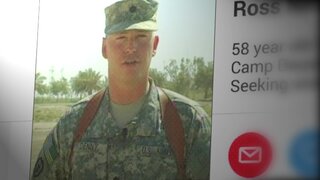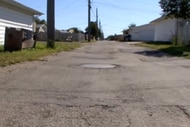Create a free profile to get unlimited access to exclusive videos, breaking news, sweepstakes, and more!
‘I Would Have Rather Been Murdered Than Have To Go Through This’: Ohio Woman Recalls Horrors Of Child Sex Trafficking Ring
Horror stories involving abducted women who are forced into sexual servitude, which is sometimes filmed and broadcasted online, have become increasingly prevalent in recent years.
At age 10, Kylee Gregg says she was forced into trashy motels, truck stops, and strangers’ basements across rural Ohio.
She said she was enslaved for years and held hostage. By the time she was 14, Gregg had been raped hundreds of times.
“I was sold to different people to be raped and it was horrific and ugly,” Gregg told Oxygen.com. “It was the worst thing that ever happened to me.”
At 10 years old, Gregg says she was forced into the horrors of sex trafficking — not by a nefarious criminal organization in a big city, but by a family in America’s heartland.
“It doesn’t start out immediately into the abuse — into the violence,” Gregg explained. “They treated me like I was one of their kids. I loved them. I trusted everything they said and I just wanted to be accepted by them.”
But it was all a mirage. Gregg quickly learned that sexual slavery was the family business — and she was expected to pay her dues.
“As a kid, I was like, ‘Oh this is just how it is. ...This is what you do when people love you,’” Gregg said.
Each year, hundreds of thousands of people are human trafficked around the world.
“It’s everywhere,” Meredith Dank, a human trafficking researcher told Oxygen.com. “We can confidently say that it's in a lot of people's backyards and oftentimes hidden in plain sight.”
In the U.S., 11,500 human trafficking tips were reported in 2019 alone, according to the U.S. National Human Trafficking Hotline. More than 70 percent of the calls involved sex trafficking. The victims were predominantly women. The bulk of those reports originated in prostitution dens like illicit spas and massage parlors.
Only a fraction of the tips, however, are ever followed up on, investigated, or prosecuted, experts said; many are made anonymously and sometimes years after the initial abuse took place.
Agriculture, construction, and the food service industry are also human trafficking hotbeds.
“People still have this idea that sex trafficking looks like the movie ‘Taken’— somebody being kidnapped off the street and sold into a life of prostitution,” Dank said. “There’s a lot more gray area [and] nuance to it.”
In 2012, President Barack Obama vowed to crack down on human trafficking. Nearly a decade later, however, reports of forced labor exploitation appear to be climbing steadily.
Ohio, where Gregg said she was exploited, registered 450 reports of human trafficking in 2019 — the fifth highest in the nation behind New York, Florida, Texas, and California, respectively.
The dark web and popular messaging apps, alike, have also emerged as a pipeline for modern slavery.
Last year, a missing Florida teenager was rescued from an alleged sex predator, Christopher Johnson, then 31, after her mother spotted her in a series of online pornographic videos.
In total, the 15-year-old allegedly appeared in 58 sexually explicit videos that were uploaded to Pornhub, Modelhub, Snapchat, and Periscope, according to an arrest affidavit obtained by Oxygen.com. The Florida teen, who vanished in December 2018, was missing for nearly a year before images of her surfaced online. According to the affidavit, the teen says Johnson impregnated her and that he took her to a clinic to have an abortion.
Johnson was arrested and charged with lewd and lascivious battery of a minor in connection to the case. He pleaded not guilty. His trial is pending.
Between 2017 and 2019, 118 instances of child sex abuse were uncovered on Pornhub by the Internet Watch Foundation, a spokesperson for the U.K.-based nonprofit tech watchdog told Oxygen.com.
“This was content uploaded by users and these instances were removed quickly upon notification,” Josh Thomas, a spokesperson for the Internet Watch Foundation, said.
Laila Mickelwait, founder of TraffickingHub, an activist movement aimed at dismantling the porn giant, said Pornhub is “infested” with — and is profiting off of — videos of human trafficking.
“They’re enabling pedo-criminals and pedophiles to exploit and consume sex crimes with impunity and with discretion and at the same time, they’re enabling and profiting off the mass rape and trafficking of women and children because they’re not making any reliable or significant efforts to protect them,” Mickelwait told Oxygen.com.
Pornhub said such allegations are “categorically false.”
“Pornhub has a steadfast commitment to eradicating and fighting any and all illegal content on the internet, including non-consensual content and under-age material,” a spokesperson for the site told Oxygen.com.
The company said it employs age-verification tools and human moderators who manually review “every single upload” on Pornhub.
“Pornhub has actively worked to put in place state-of-the-art, comprehensive safeguards across its platform to combat and remove all unauthorized content that breaches the platform’s policies,” the company added.
Last February, Mickelwait authored a viral petition on Change.org demanding Pornhub’s shutdown. Several anti-trafficking organizations and adult entertainment stars such as Jenna Jameson have backed the cause. It’s since tallied more than 1 million signatures.
“They have to be held accountable for what they’re doing,” Mickelwait said. “A slap on the wrist is not going to do justice to the many victims whose lives have been destroyed because their trauma has been perpetuated, multiplied, and monetized on the world’s largest and most popular porn site.”
In 2019, Pornhub racked up 42 billion views and logged 6.83 million new video uploads, according to the company.
Mickelwait said it’s impossible for Pornhub to verify the age — or whether sex is consensual — in its millions of adult films. This gaping blind spot, she said, is actively exploited by human traffickers.
“Most people are under the delusion that those who are on these sites that are on the world wide web are consenting adults,” she added. “There’s no way that they can go on that site and with confidence, know that they’re not watching a rape or trafficking victim.”
By definition, any minor involved in a commercial sex act is a victim of human trafficking.
In 2019, GirlsDoPorn.com, was shuttered after its executives were indicted in a sprawling sex trafficking case in California, which is ongoing. Twenty-two women, who were coerced into participating in the site’s adult films, won a $13 million lawsuit against the former amateur porn site last year.
Backpage.com, a sex-work classifieds portal, long-suspected of “virtual” pimping, was also seized by federal agents in 2018.
Mainstream pornography sites aren’t the only platforms struggling to curb an insurgence of user-generated content which depict the sexploitation of children — and possible instances of human trafficking.
In the first half of 2020, for example, Facebook flagged 18.1 million possible instances of child pornography, according to the social media giant’s latest Community Standards Enforcement Report.
“We do not allow content that sexually exploits or endangers children on Facebook. When we find this type of violating content, we remove it, regardless of the context or the person's motivation for sharing it,” Facebook said in the report.
By comparison, Twitter suspended 257,768 unique accounts between July and December 2019 for posting about child sex abuse.
Neglected and abused children, foster kids, runaways, and teens with addiction issues are more likely to be lured into child human trafficking.
“I didn't have my basic needs met by any parental figure,” Gregg recalled. “I didn't always know where I was going to sleep, or what I was going to eat.”
In 2010, Gregg’s parents divorced. She was 10.
“It was a very toxic environment,” Gregg said.
As a custody battle simmered, Gregg says her mother cut her off from her father.
“Traffickers know how to prey on these physical and emotional needs of youth to lure them into 'the life' of sex trafficking where they are manipulated and quickly become dependent on the trafficker to meet these needs,” said Anna Schramm, a research associate at the University of Toledo’s Human Trafficking and Social Justice Institute.
“Their needs are most likely not being met, whether that be physical needs of housing, food, and clothing or emotional needs of love, acceptance, and trust.”
By 13, Gregg was raped daily, hooked on painkillers, and desperate to escape the cycle of abuse. The family allegedly threatened to murder her if she ever left or told anyone. In 2014, Gregg’s father secured court-ordered visitation rights and eventually rescued her.
Gregg has since relocated to Toledo. In 2018, she graduated high school and is now studying social work and pre-law at the University of Toledo. The 20-year-old has been diagnosed with complex post-traumatic stress disorder and regularly sees a psychiatrist.
“It really took my life...I would have rather been murdered than have to go through this,” she said. “It was horrible and it affected me every second of every day and it still does.”
Gregg has since emerged as an outspoken anti-human trafficking activist.
Formal charges were never pressed against the rural family who allegedly trafficked Gregg for nearly half a decade. Ohio’s Child Protective Services were notified of the allegations in 2015 but closed their investigation, she said, citing a lack of evidence.
“These people belong in jail,” Gregg said.
In 2018, Gregg also submitted an anonymous tip to the U.S. National Human Trafficking Hotline regarding the family of traffickers. Her report was recorded and passed onto law enforcement, a spokesperson for the agency confirmed. However, it’s unclear if her allegations were ever seriously investigated.
“Once that information is reported to the appropriate agencies, however, the Trafficking Hotline is not involved in the investigative process and we do not always receive updates on situations we have sent to law enforcement...which is what happened in this case,” Ayan Ahmed, a communications specialist for Polaris Project, a nonprofit which runs the U.S. National Human Trafficking Hotline, told Oxygen.com.
She’s constantly haunted by the prospect that the predatory family is still operating.
“If I didn’t get justice...then there’s no reason for them to have stopped,” Gregg said.
Editor’s Note: Suspected cases of human trafficking can be anonymously reported to the U.S. National Human Trafficking Hotline at 1-888-373-7888.

































